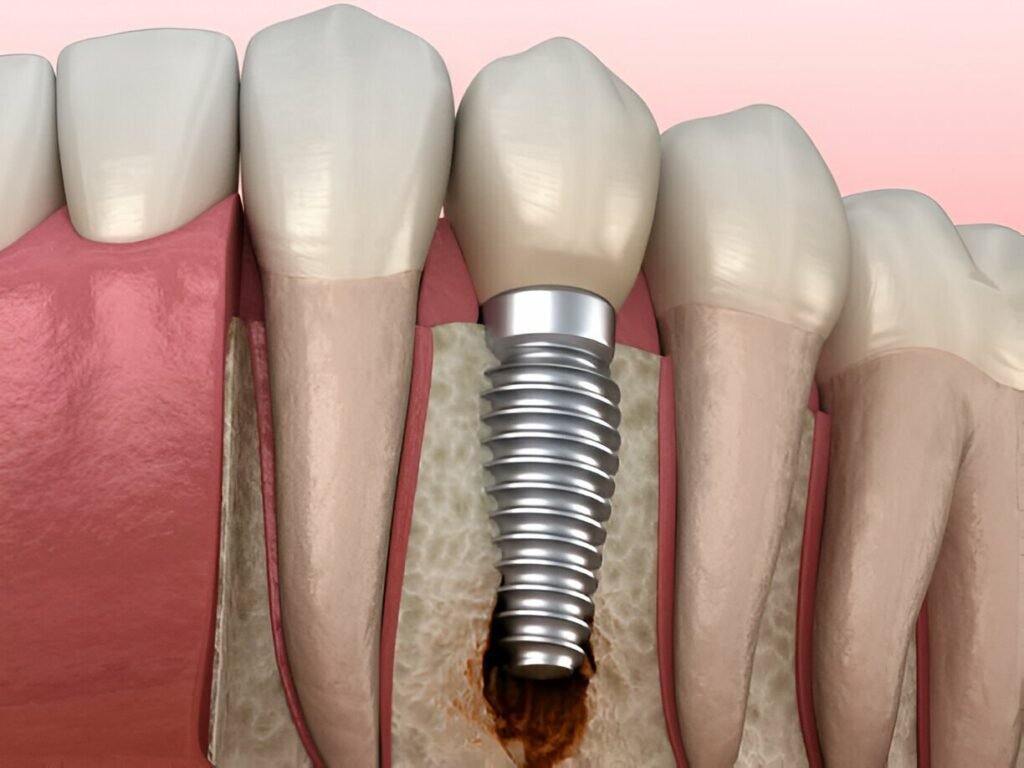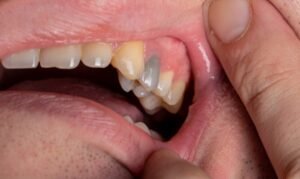Peri-implantitis is a tricky condition that can mess with your dental implants, causing them a whole lot of trouble. If you’ve got dental implants, knowing the signs of this condition is key to keeping your smile bright and healthy. This article will guide you through what peri-implantitis is, its symptoms, and how you can spot it early.
Understanding Peri-Implantitis
Peri-implantitis is an infection that harms the gums and bone around dental implants. Think of it as a sneaky bug that gets in and causes swelling, redness, and sometimes even bone loss if not caught in time. It’s important because it can make your dental implants loose or cause them to fail completely.
Common Symptoms to Watch Out For
The first step in tackling peri-implantitis is to catch it early. Here’s what you should look out for:
Red and Swollen Gums
One of the first signs you might notice is your gums getting red and puffy around the implant. It doesn’t feel right, and it doesn’t look right either.
Pain and Discomfort
If touching your gums or chewing makes you wince, it could be a shout from your gums that something’s wrong.
Bad Breath or a Nasty Taste
An ongoing bad taste in your mouth or bad breath that doesn’t go away with brushing might be a signal of infection lurking below.
Bleeding or Pus
If you see a bit of blood or pus around your implants when you brush or floss, it’s a red flag that peri-implantitis might be setting in.
Loose Implants
Feel like your implant isn’t as firm as it used to be? That could be a sign that the bone around it is being damaged by infection.
Early Signs You Might Miss
Sometimes, peri-implantitis starts quietly. Here are a few early whispers to listen for:
- Mild Gum Bleeding: Notice a bit of pink on your toothbrush? Time to pay attention.
- Slight Swelling: If your gums look a bit puffed up, don’t ignore it.
- Sensitivity: A sudden feeling of discomfort around your implants when you have hot or cold drinks could be an early clue.
How to Prevent Peri-Implantitis
Stopping peri-implantitis starts with good gum guard tactics. Here’s how you can keep those gums grin-worthy:
- Brush and Floss Regularly: Get into all the nooks and crannies around your implants with a soft-bristle brush and floss daily.
- Quit Smoking: Smoking’s a no-go as it weakens your body’s bug-fighting powers, especially around your gums.
- Regular Dental Check-ups: Let your dentist have a nosy around your implants regularly to catch any early signs of trouble.
Treating Peri-Implantitis
Caught early, peri-implantitis can often be sorted with a good clean and maybe some antibiotics. But if it’s gotten a bit more serious, you might need more involved treatments like:
- Deep Cleaning: Where your dentist cleans out the bacteria from under your gums.
- Laser Therapy: A clever way to zap the bugs without being too harsh on your gums.
- Surgery: If things are really serious, you might need a bit of surgery to get your gums and bone back in shape.
Protect Your Smile at GK Dental Implants and Cosmetic Clinic
If you’re concerned about the health of your dental implants or if you’re experiencing any signs of peri-implantitis, don’t wait. Contact GK Dental Implants and Cosmetic Clinic today. As a trusted NHS dentist in Dumfries, we’re dedicated to providing top-notch care to ensure your dental health is in the best shape. Book your appointment now and let us help you maintain that winning smile!
This guide should help you spot peri-implantitis early and take the right steps to deal with it. Remember, when it comes to your health, being in the know is the best way to go!







